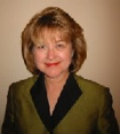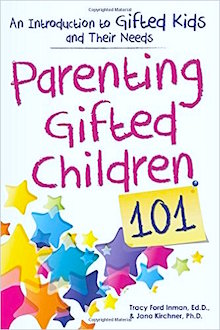Teaching and Parenting Gifted Children 101
Parenting Gifted Children 101: An Introduction to Gifted Kids and Their Needs
By Tracy Ford Inman, Ed.D., and Jana Kirchner, Ph.D.
(Prufrock Press, 2016 – Learn more)

My only regret about this wonderful, comprehensive and up-to-date book for parents is that, because of the title, it might not get into the hands of teachers and administrators who also need to know where they can improve and what they are doing right.

Understanding giftedness
What does it mean to be gifted? Although the most important definition comes from the reader’s state and district, giftedness was redefined in 2011 by three thinkers who examined a century of research. This new definition consists of three developmental stages that need cultivation: Potential, achievement, and eminence.
Regardless of the definition, gifted and talented students learn differently and require services and accommodations to thrive. There are six identified areas of giftedness, a high IQ being only one, and no one measure should be used for identification.
Important ESSA improvements
Services need to be matched to the area of giftedness, and being gifted in one area does not mean being gifted in all. The ESSA (Every Student Succeeds Act) of 2015 improves provisions that support gifted and talented education (GATE), so it’s important that GATE coordinators and principals are familiar with this act, even though identification, services, and funding fall to states themselves.
Websites are suggested where the reader can find out what each state provides. The book discusses parent’s rights, as well, such as the right to ask for a copy of the district or school policies. There is no discussion of how charter schools are handling the policies. Regardless of laws and policies, an actual Gifted Children’s Bill of Rights is provided.
Myths about the gifted
Myths about GATE children exist, in my opinion, at even the best schools. One is that they get by even if left alone, and that grade skipping or early entrance to kindergarten are socially and emotionally damaging. They’re not. Did you know that from 10 to 50 percent are underachievers and that even a child with a learning disability can be gifted? Myths exist because most teachers never had a GATE course in college or in staff development.
There are common attributes of the gifted, such as passionate intensity about a certain topic or topics and novel approaches to solving problems (see Helping Gifted Kids Cope with Intensity recently reviewed on Middleweb by Amy Estersohn).
An advanced sense of humor can get children in trouble or cause misunderstandings. Parents should model how they learn and show them that mistakes are okay. The book addresses a gifted child’s social and emotional needs as well as how to praise effort and choice and the growth vs. fixed mindset.
Intentional daily services
The school has to provide a variety of intentional daily services, not “programs.” A program is a one-shot event where perhaps your child is pulled out once a month. Kids, however, are gifted 24/7 and have the right to differentiated instruction and the opportunity to learn something new daily. Services fall into two main categories, acceleration and enrichment. The authors share a chart showing 20 different ways to accelerate, and there are several enrichment opportunities on another chart, each one defined.
Generally, teachers aren’t trained to differentiate. In some states, such as California, they are trained to differentiate for limited English (most are not hired without a CLAD certificate) and special education students, but not for GATE.
Differentiation does not mean more work, and students cannot learn something they’ve already mastered, hence the need for pre-assessments. Another important warning is that differentiation is not having GATE students tutoring others. This is a common strategy, but the authors emphasize that if the student is teaching another, he or she is not learning themselves.
Inman and Kirchner’s discussion of choices for the gifted in terms of curriculum and books made me sad that we no longer have the electives on the secondary level for all students. For a few years in the seventies we had courses in English such as “Mass Media,” “Science Fiction,” “Short Story,” and more. Students couldn’t wait to get into the class of their choice. Maybe we need to go back and examine what many felt were foolish fads.
However, teachers will like the “grouping options” listed and will be able to name them with this book (“Cluster,” “Pull-out,” “Cooperative.”)
The glossary at the back, in addition to the resources listed, is extensive. However, I wouldn’t want a parent to use this by coming into the school and asking, for example, how I as a teacher was using “curriculum compacting” if I didn’t know what it meant.
Meeting the challenge at home and school
There are implications for home and school at the end of each chapter. GATE students definitely need to be challenged, and I challenge parents and educators to share this book with school and district personnel, including gifted education committees so we can all be informed. If your school doesn’t have such a committee, begin one.
Help your student be in the know as to her rights, as well. After all, as the authors point out, the gifted are our future doctors, lawyers, technicians, writers, dancers and, I hope, teachers. Be an advocate for your child and begin by getting this book into the right hands.
Dr. Mary Langer Thompson’s articles, short stories, and poetry appear in various journals and anthologies. She has been a GATE teacher and coordinator. She is a retired school principal, who now writes full time.






























